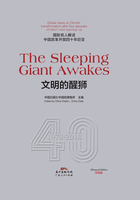
China Is Always Embracing Cooper-ation
It is Asia which, thanks to its knowledge and discoveries, enriched Western knowledge in many fields

Louis Godart
Louis Godart was a professor of Aegean Civilizations in the Faculty of Letters at the University of Naples Federico II (1973—2002). He was the counsellor for Artistic Heritage of the President of Italian (2002—2016) and now a professor at the NETTUNO University. He is also author of 74 monographs and 300 scientific articles on Europe, art history, human rights, the Mediterranean civilizations and their history.
In 2004, I was in China to prepare for the state visit of the Italian President Carlo Azeglio Ciampi, and I had the pleasure to see the splendid China Millennium Monument in Beijing.
I was very much impressed by the great fresco in the immense Rotundas of the Museum where the entire story of China, from prehistoric to modern times, was represented.
Among the many personalities who made China great, Deng Xiaoping was at the prow, indicating the road to follow to make China even greater in the third millennium.
When I went back to Italy, I told President Ciampi my impres sions and said how glad I was to see that, among all the personalities recorded on the fresco, there were only two foreigners and they were Italians: Marco Polo and Matteo Ricci.
During his visit to China, President Ciampi went to visit the museum and had exactly the same impression as I had: modern China will follow the message of Deng Xiaoping.
First, it is clear that modern China following Deng's teachings is capable of influencing the global economy. Its history spans thousands of years, and along with its international stature, great culture and dynamism, it is a country which many seek to emulate.
Modern China understands that dialogue and cooperation between all nations is the best way to promote peace and prosperity.
Second, the historical speech delivered by President Xi Jinping at the Boao Forum for Asia on the island of Hainan on March 28, 2015, which was attended by 16 heads of state and government and around 100 ministers belonging to 65 countries, was a perfect illustration of what was the vision of Deng Xiaoping. The president launched the grand project of a “Belt and Road Intiative”, which comprises land links connecting Xi'an with Athens, Venice and Rotterdam.
The “Belt and Road Intiative” will involve 65 countries representing 4.4 billion people; in other words, 63 percent of the world's population is involved in the creation of this axis that will connect the Orient to the Occident across Eurasia.
As things currently stand, the states and territories involved account for only 29 percent of the planet's production but it is quite clear that we are at the beginning of a redressing of the global balance, in which Eurasia will play a leading role. China predicts that within 10 years of the creation of this project, commercial ties between the countries positioned along the “Belt and Road Intiative” will more than double to reach $2.5 trillion.
This great project is coming up because China gives priority to diplomatic and commercial matters. This project is also possible due to the new age of the internet where the IT revolution has blown away the old geopolitical rivalries between continental and maritime powers.
President Xi is reopening a commercial connection, which for thousands of years, without considering the many misunderstandings, has seen happy cooperation between the Far East and Europe.
Now, at the beginning of the 21stcentury, China and Europe stand strengthened by their history and future possibilities, which can unlock their dynamic potential and have a common interest in an alliance to change the face of the earth.
I would like to underline the issues concerning the Silk Road from a European perspective, which means reflecting on what has been for centuries the riches obtained by Europe through contact with China, its culture, its economy and its history. Rather than being a threat to Europe, the Orient has in fact been an inexhaustible mine of economic, cultural and spiritual enrichment for the entire Old Continent.
It was Asian products which the Normans imported on their ships; it was Asia which the Avars introduced into Hungary; the intermediaries between the West and Asia have been Russians and Ukrainians; it is from the Asian steppe that such irreplace able gifts were introduced such as the horse-saddle, the stirrup, the horse shoe, the wheeled plough, falconry, some kinds of clothing, many plants — in particular tea, rye and hops — not to mention the compass, paper, printing, and excellent Chinese inventions from gunpowder to cannons.
It is Asia which, thanks to its knowledge and discoveries, has enriched Western knowledge in the fields of medicine (history had repeated itself with the recent Nobel prize for medicine awarded to Chinese researcher Youyou Tu for her work on malaria based on the ancient Chinese science of plant-based treatments; the same may be said of mathematics, cosmography, pharmacology and poetry (consider the Arabian sources for Dante's Divine Comedy). It is across this infinitely permeable frontier that Europe has acquired its appearance and many features of its personality and culture.
I am therefore convinced that, along with Lucien Febvre, we may declare: “Europe has been strengthened together with Asia and thanks to Asia.”
I believe it is unacceptable to build barriers to the circulation of goods and products between nations. The message of Deng Xiaoping and Xi Jinping is clear: opening up the mind allows all the peoples of the world to collaborate for the building of a planet with peace and prosperity.